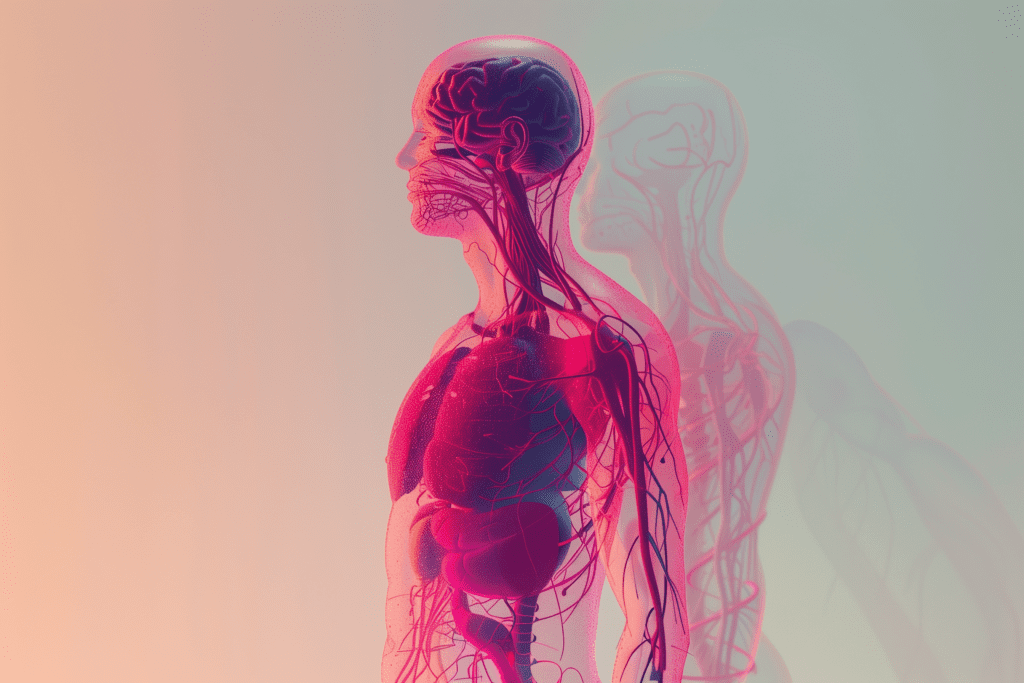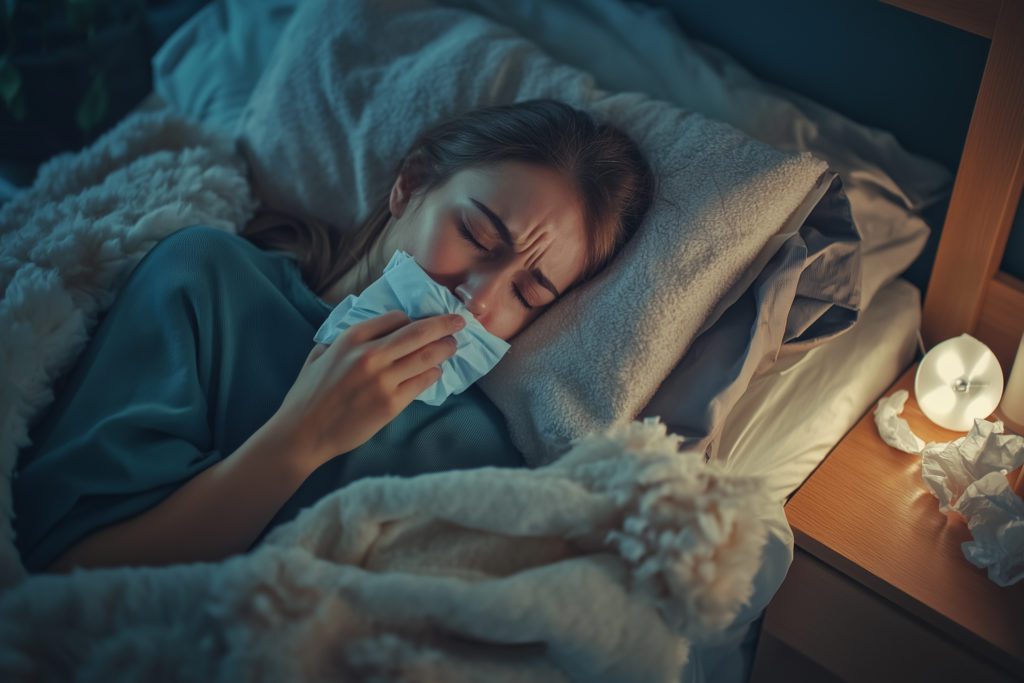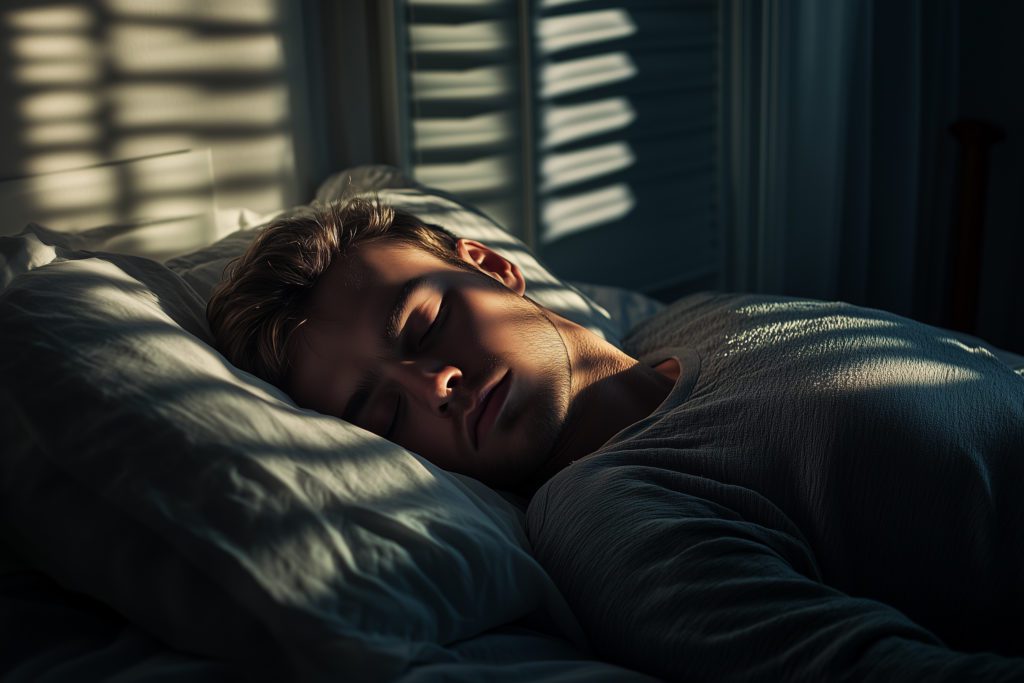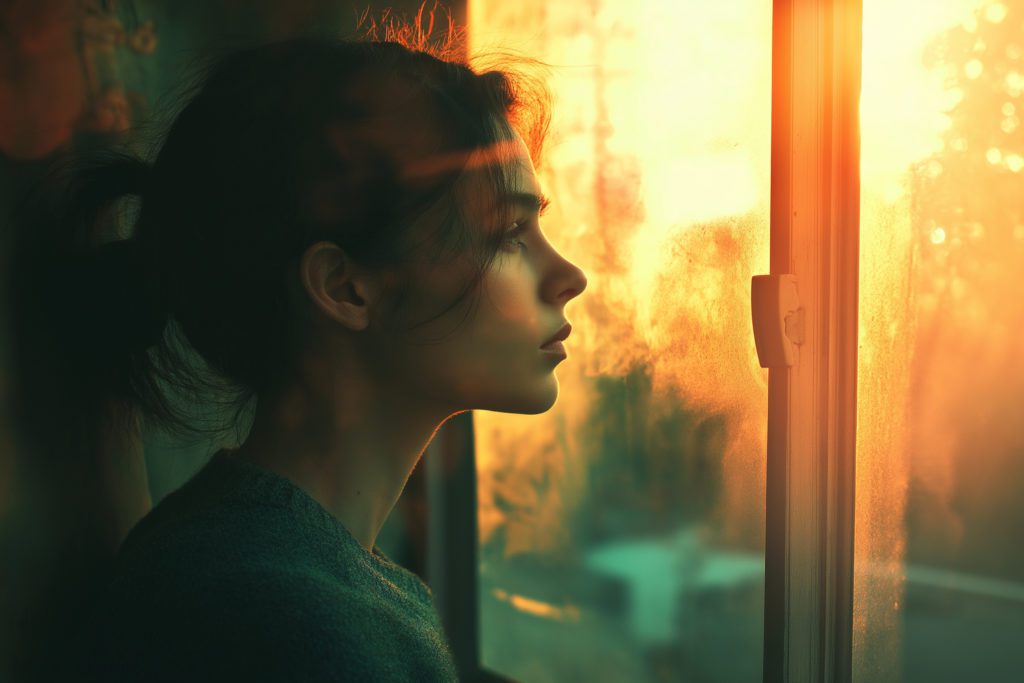
COVID-19 and Sleep
Since the early days of the pandemic, doctors have reported abnormally high incidents of sleep disorders and disruptions to patients’ sleep patterns.

As cases have increased and years have passed, we’re still seeing more people experiencing poor sleep during and after COVID infection.
Some people describe insomnia symptoms, such as struggling to fall or stay asleep, while others report feeling constantly exhausted and unable to get enough rest. Although symptoms are wide-ranging, researchers are beginning to see a strong link between COVID-19 and sleep quality.
So, why is COVID-19 impacting our sleep, and what does it mean for people suffering from more long-term infections? In this article, we’ll look at why the coronavirus can affect sleep long after infection and what you can do to get back on track as part of your recovery.
How sleep affects immunity
Sleep is essential for nearly every process in the body, including our metabolism and immune function. You may also be surprised to learn that the age-old advice of “getting some rest” is immensely helpful in aiding and enhancing recovery from most illnesses.
Sleep deprivation can affect not only your mood and cognitive performance but also the body’s ability to fight infections. Essentially, when our body is fighting off an illness, it triggers an immune response. Part of this response is the production of various proteins known as cytokines, which help boost the immune system and combat sickness. While we sleep, our bodies increase the production of these cytokines, improving our chance of survival from the infection. This phenomenon is one reason why sleep is vital when you’re sick.
Additionally, substantial evidence supports the theory that some cytokines are involved in promoting sleep. These proteins are known as sleep regulatory substances (SRS) and are typically released during times of sleep deprivation. In this way, cytokines also help ensure our bodies get enough sleep to function correctly.
Finally, sleep and immunity have a bidirectional relationship. In other words, just as poor sleep can negatively impact immune function, a compromised immune system can negatively affect sleep quality.
Viral infections and sleep
While research surrounding the specific effects of COVID-19 on sleep is ongoing, we do know what happens to sleep quality in patients suffering from other viral infections. For example, one study that focused on the common cold found that symptomatic patients had a reduced sleep duration, poorer cognitive performance, and less consolidated sleep than those who were asymptomatic.
Another study on people with respiratory infections found that, while symptomatic, patients had increased sleep time but unfortunately experienced more awakenings during sleep. The researchers also noted that patients had increased difficulty falling asleep and poorer sleep quality.
Effects of COVID-19 on sleep
The coronavirus has affected everyone in many ways, and sleep is no exception. Four in every ten individuals has reported a sleep problem during the COVID-19 pandemic. Of those dealing with sleep disorders and disturbances, patients infected with COVID-19, children, and adolescents appear to be the most affected.
The issue has become so widespread that researchers have coined a new term to refer to the sleep challenges related to the pandemic – “coronasomnia.” Depending on the person, these effects may be either short- or long-term.
Short-term effects
“Coronasomnia” is often described as COVID-induced insomnia frequently attributed to pandemic-related stress, depression, anxiety, and other mental health conditions. Additionally, while general fatigue is a common symptom of the coronavirus, more serious sleep disorders like insomnia may also occur after a person contracts the virus.
Many studies have shown that people with COVID-19 often have short-term sleeping problems. These issues may result from symptoms like cough and fever and the use of certain medications that can interfere with sleep.
Sleep specialists have also noted circadian rhythm disorders in COVID-19 patients. In these cases, a person’s internal body clock is “out of sync.” As a result, they typically experience difficulty falling asleep, wake up at odd times of the night or too early, and find it challenging to fall back asleep. In addition, these delayed cycles can extend into the following day, causing symptoms like grogginess and chronic fatigue.
Long-term effects
Although most patients find relief and recover after a couple of weeks, many people suffer from prolonged COVID-related symptoms more than three to four weeks after infection. Now known as “long COVID,” this condition describes both ongoing symptomatic COVID-19 (from 4 to 12 weeks after infection) and the development of symptoms post-COVID (after 12 weeks or more).
People with long COVID often experience brain fog, headaches, muscle weakness, and insomnia. The reason behind these long-term infections is uncertain. What is clear is that the ongoing condition can interfere with your sleep. New studies are already showing a drastic decrease in both sleep quality and quantity in people with long COVID.
One notable 2022 study at the Cleveland Clinic found that more than 40% of people with long COVID had moderate to severe sleep issues. Furthermore, about 7% of study participants reported severe COVID-related sleep problems, including insomnia.
Possible causes for sleep disturbances during and after COVID-19
So, what is the cause of all the sleep disturbances patients experience during and after COVID-19? More research is necessary, but there appear to be several reasons, including widespread residual inflammation and, more likely, mental health-related COVID symptoms, such as anxiety, stress, and depression.
It’s also important to note the close relationship between mental health and sleep quality. For example, poor sleep can intensify stress and anxiety and make patients feel worse than they typically would after a good night’s sleep. In contrast, getting adequate, good quality sleep can help improve these symptoms.
Similarly, sleep disorders like insomnia are often self-perpetuating. In other words, the more you can’t sleep, the more you worry, and the more you worry, the less you sleep. Other factors, such as genetics and existing mood disorders, may also cause some people to be more likely to develop symptoms of “COVID insomnia.”
How to overcome sleep problems caused by COVID-19
At this point, there is little data to determine precisely how long COVID-related sleep disorders may last. The best advice for those suffering from sleep disruptions during or after infection is to try not to rush recovery. However, the following tips may help you improve your sleep and avoid chronic insomnia:
• Avoid napping throughout the day; if you must take a nap, limit it to 20 minutes
• Avoid using electronics, including cell phones, tablets, and laptops, in bed
• Try not to eat large meals for at least a few hours before bed
• Get some exercise during the day, but not close to bedtime
• Make sure your bedroom is cool, dark, and comfortable
• Maintain a consistent wake and sleep schedule
• Limit alcohol and caffeine consumption
If you employ all the previous suggestions and still struggle with insomnia or excessive fatigue following a COVID infection, it’s always best to see a doctor for a thorough exam. A doctor or sleep specialist can offer more specific advice and treatment for many sleep disorders, including those caused by COVID-19.
References
- James M. Krueger, David M. Rector, and Lynn Churchill - Sleep And Cytokines
https://www.ncbi.nlm.nih.gov/pmc/articles/PMC2605347/ - C L Drake, T A Roehrs, H Royer, G Koshorek, R B Turner, T Roth - Effects of an experimentally induced rhinovirus cold on sleep, performance, and daytime alertness
https://pubmed.ncbi.nlm.nih.gov/11134688/ - Julie Lasselin, Michael Ingre, Christina Regenbogen, Mats J Olsson, Maria Garke, Mia Brytting, Rachel Edgar, Mats Lekander, John Axelsson - Sleep during naturally occurring respiratory infections: A pilot study
https://pubmed.ncbi.nlm.nih.gov/30742884/ - Circadian Rhythm Sleep Disorders
https://my.clevelandclinic.org/health/diseases/12115-circadian-rhythm-disorders - Long COVID or Post-COVID Conditions
https://www.cdc.gov/covid/long-term-effects/?CDC_AAref_Val=https://www.cdc.gov/coronavirus/2019-ncov/long-term-effects/index.html - Cinthya Pena Orbea, Brittany Lapin, Irene Katzan, Kristin Englund, Nancy Foldvary-Schaefer, Reena Mehra - 0735 Sleep Disturbances in Post-Acute Sequelae of COVID-19 (PASC)
https://academic.oup.com/sleep/article/45/Supplement_1/A321/6592670
FAQ
Does the COVID-19 vaccine affect sleep?
Mild side effects like fever, aches, or fatigue after vaccination can temporarily disrupt sleep. These typically resolve within a few days. Staying hydrated and resting can help improve sleep during recovery.
How does increased screen time during the pandemic affect sleep?
Increased screen time, especially at night, suppresses melatonin production due to blue light exposure and delays the natural sleep-wake cycle. Stress from pandemic-related news and social media can further disrupt sleep. Reducing screen use an hour before bedtime, enabling blue-light filters, and engaging in non-screen activities like reading can help improve sleep.
Are people with pre-existing sleep disorders more vulnerable to COVID-19 complications?
Yes, sleep disorders like obstructive sleep apnea can increase the risk of severe COVID-19 outcomes. Reduced oxygen levels and poor-quality sleep weaken the immune system, making it harder to fight infections. Managing sleep disorders with treatments like CPAP machines and maintaining a healthy lifestyle can lower these risks.
Can quarantine-induced inactivity disrupt sleep cycles?
Yes, staying indoors with little physical activity can upset the body’s circadian rhythm, leading to trouble falling asleep or waking up on time. Exercise, even light activities like stretching or walking, and exposure to natural light during the day can restore a healthy sleep schedule.
How does alcohol consumption during the pandemic affect sleep?
Alcohol may make you feel sleepy at first, but it disrupts restorative REM sleep and can cause frequent nighttime awakenings. Increased alcohol use during the pandemic as a coping mechanism has worsened sleep for many. Reducing or avoiding alcohol, particularly in the evening, can improve both sleep quality and overall health.

Written by
Kayla Orange
Seasoned healthcare writer with experience writing for various medical professionals and organizations, including general doctors, dentists, plastic surgeons, and sleep specialists.
Download Pillow
Get help
Press & News
Legal
Connect
X (Twitter)
Company
Copyright © Neybox Digital Ltd.



